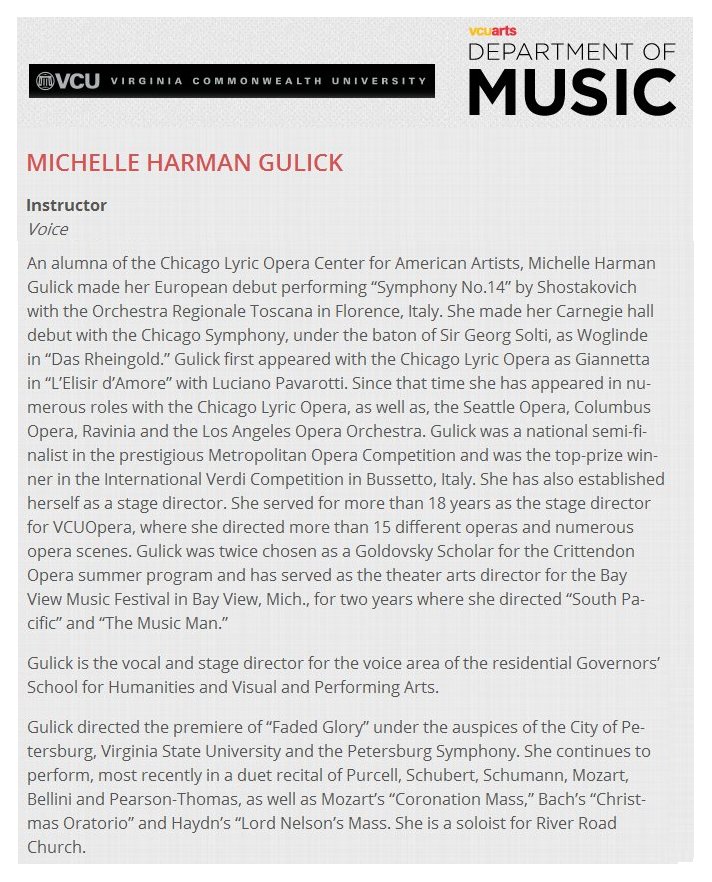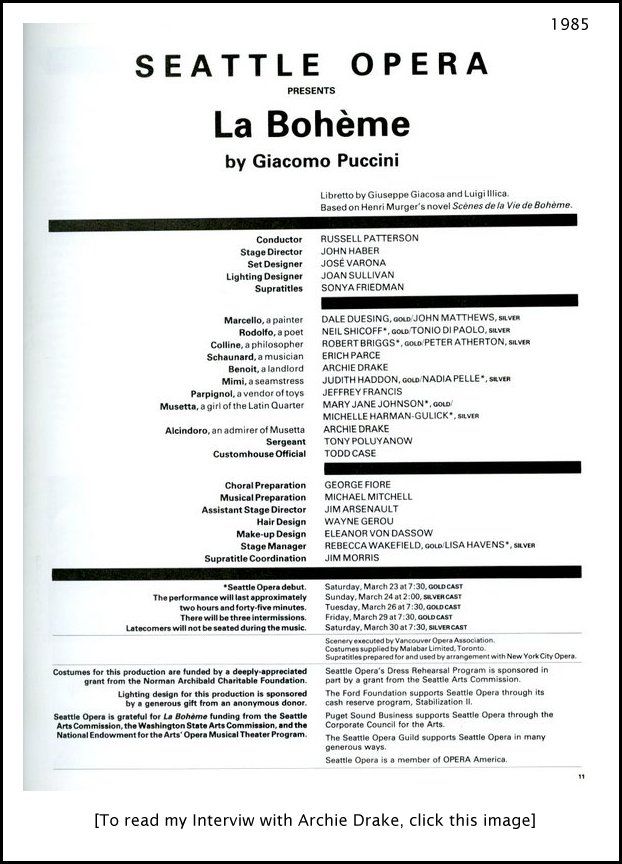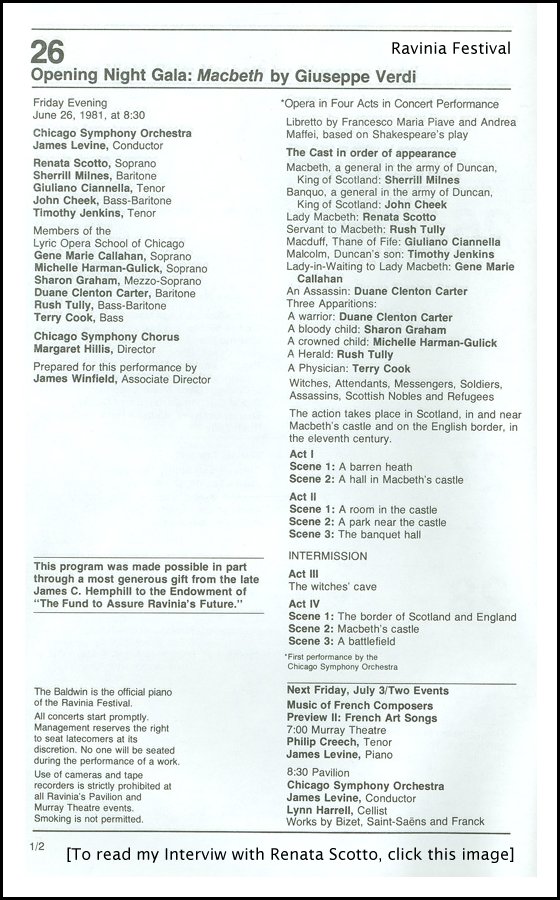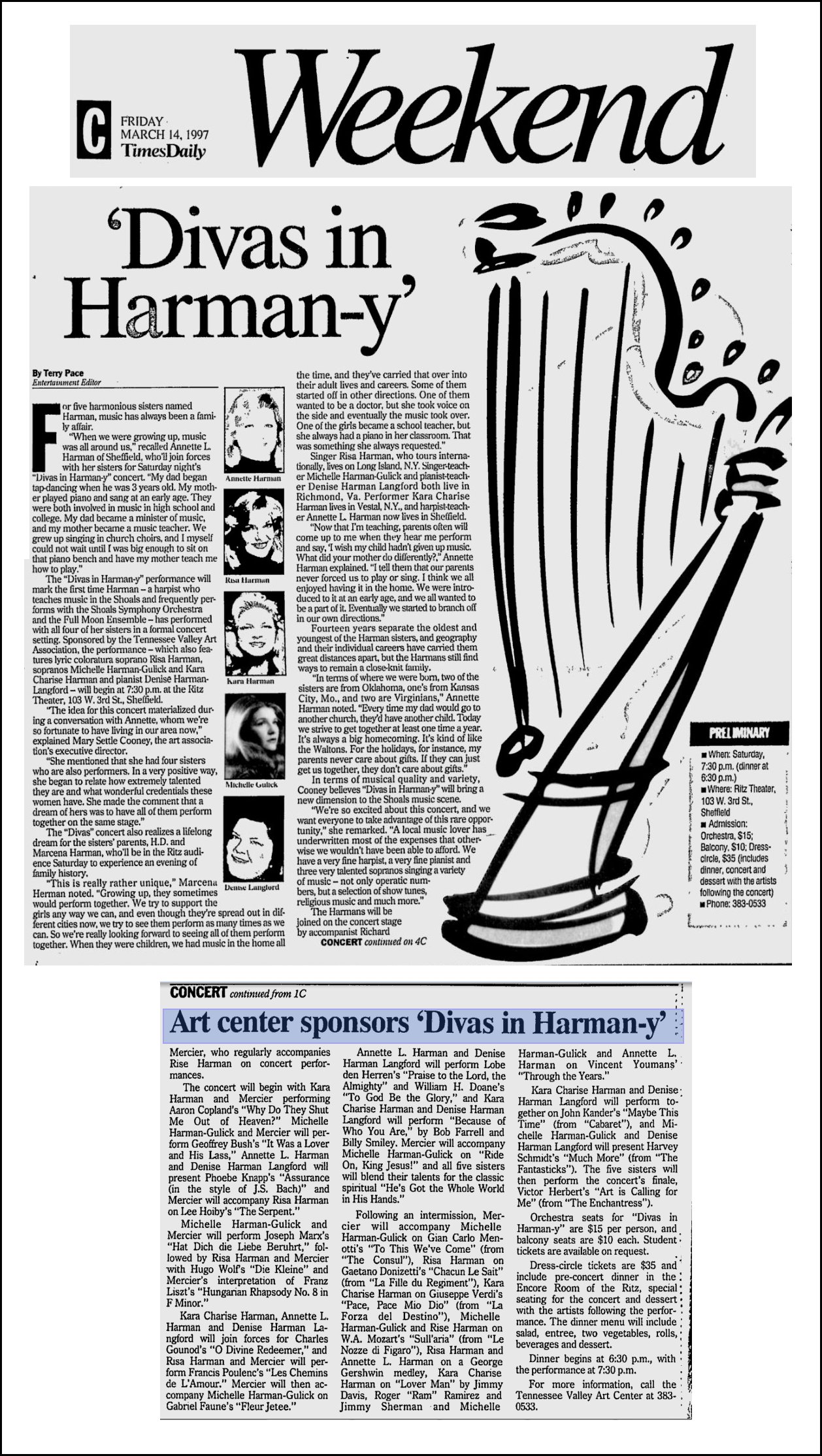A Conversation with Bruce Duffie


|
Michelle
Harman Gulick at Lyric Opera of Chicago
1981 - L'elisir d'Amore (Giannetta) with Buchanan, Bergonzi/Pavarotti, Sereni/Duesing, Montarsolo; Bartoletti Ariadne auf Naxos (Echo) with Meier/Rysanek, Johns, Schmidt/Minton, Welting, Nolen, Gordon, Negrini; Janowski 1982 - Madama Butterfly (Kate) with Mauti-Nunziata, Ciannella/Moldoveanu, Bruscantini, Zilio, Andreolli, Cook, Del Carlo; Gómez-Martinez, Prince 1983 - [Spring Season] Mikado (Yum-Yum) with Rosenshein, Wildermann, Curry, Adams; Smith, Sellars [See review below] [Fall Season] Cenerentola (Clorinda) with Baltsa, Blake, Desderi, Nolen; Ferro |
| OPERA: 'THE MIKADO,' CHICAGO
LYRIC COMPANY By DONAL HENAHAN, Special to The New York Times Published: May 13, 1983 CHICAGO, May 12— Right off, you might have suspected that the Lyric Opera of Chicago's new production of ''The Mikado'' was going to be unusual. During the playing of the overture at last night's premiere, young ladies dressed as Northwest Orient stewardesses stood onstage and in the audience rhythmically miming the familiar airline drill with seat belts, oxygen masks and life vests. Suspicion deepened when the production, having landed in Japan, took us into a corporate boardroom behind which flashed signs advertising Sony, Canon, Toshiba, Fuji and that universal solvent Coca-Cola. The first number, ''If You Want to Know Who We Are,'' was sung by a chorus of executive clones, 20th-century ''gentlemen of Japan'' identically made up in black business suits, black glasses and black toupees. All doubt as to orientation of this ''Mikado'' fell away when Nanki-Poo, the wandering minstrel, arrived on a motorcycle, wearing shades and brandishing an electric guitar. The noble lord Pish-Tush wore the gear of a Texan and spoke with a yahoo accent. The three little maids from school, miniskirted and hormonally aroused by the very sight of Nanki-Poo (Neil Rosenshein), boogied to the strains of a shoulder-held ''big radio.'' For a moment, I thought I had wandered into a revival of ''Bye Bye Birdie.'' But no. It was the town of Titipu transported to the modern world of high-tech and low comedy. It was Gilbert and Sullivan as filtered through the churning brain of Peter Sellars, the young director who recently has been stirring things up in the theatrical and operatic worlds. He has even aroused some critics to hurl the word ''genius'' at him. Mr. Sellars, you may recall, dropped out as director of ''My One and Only'' when the producers found his ideas too bizarre. His ''Mikado'' is designed to be a 1983 model. It is full of modernizing twists and fanciful flights, many of which are good for laughs and most of which are at least good for smiles. When Ko-Ko (James Billings) recites his ''little list'' of people ''who never would be missed,'' he unfurls a seemingly endless computer printout. Yum-Yum (Michelle Harman-Gulick) sings of her own unutterable beauty while wielding a hot comb, regarding her perfect image in an electrically lighted vanity mirror and cuddling a Snoopy doll. Ko-Ko's garden is protected by one of those purple lights that zap bugs. The Mikado himself (Donald Adams) arrives in a sporty red Datsun (license plate MI-YA-SAMA) preceded by Secret Service types. None of this, no matter how clever, is likely to charm G. & S. hardliners, for whom much of the appeal of the operettas lies in their adherence to the D'Oyly Carte tradition. For them, Mr. Sellars will seem merely a misguided youth who puts the horseplay before the Carte, a trendy miscreant who deserves a punishment to fit his crime -something lingering involving boiling oil. That is probably too severe a judgment, but it must be said that Mr. Sellars did not entirely succeed with his ''Mikado,'' even on his own terms. The flashes of Lampoon humor did not compensate for the loss of G. & S. subleties in both music and characterization. Craig Smith's able conducting sometimes prevailed against Mr. Sellars's frenetic staging, but Mr. Billings went along all too willingly with the staging's parodistic tone, stressing the hard-edged, whining side of Ko-Ko so much that his gentle befuddlement could not crack through. Yum-Yum, similarly, has a heart of stone, but that is only funny if she is also implacably sweet, prim and proper. Making her a crude teenybopper was good for giggles, but once the basic joke was set out, variations became predictable. Whatever complaints might have been lodged against the evening, however, were wiped away by the appearance of Mr. Adams, that grand old Savoyard, in one of his most famous parts. His trembling delight in finding tortures to fit crimes continues to be, after more than 2,000 performances as the Mikado, a comedic tour de force. William Wildermann, too, knew what he was up to as Pooh-Bah, the ultimate bureaucrat, and Mr. Rosenshein's bright tenor and ingenuous style were right for Nanki-Poo. Dan Sullivan was an aptly pompous Pish-Tush. Diane Curry, though not sufficiently decayed to be an ideal Katisha, would have been perfectly acceptable if more of her words had come through. |
 MHG: Yes and
no. It’s good because the Americans are starting to establish
themselves as singers, but it’s bad because it still has not caught on
as much as it could. It will eventually because there are more
young people that are interested. It’s really the responsibility
of the people coming along to spread it and get propel over the idea
that it’s only for the elite.
MHG: Yes and
no. It’s good because the Americans are starting to establish
themselves as singers, but it’s bad because it still has not caught on
as much as it could. It will eventually because there are more
young people that are interested. It’s really the responsibility
of the people coming along to spread it and get propel over the idea
that it’s only for the elite. MHG: It’s very
difficult. When you have a really light voice you have no choice,
or at least not as big a choice because there are only a few roles you
will be asked to sing. It’s the same with a really dramatic
voice, but those voices in the middle have more problems. You
have to look and see which direction the voice is going — either
lighter or heavier. Some people hear only the darker colors in
the voice and ask for heavier roles. Other people hear only the
coloratura and push you into those roles. So I choose roles that
suit my voice and look like they will be what my voice will be capable
of in the near future. I sing lots of Mozart and a few Verdi
roles, and the French repertoire is good for me right now.
MHG: It’s very
difficult. When you have a really light voice you have no choice,
or at least not as big a choice because there are only a few roles you
will be asked to sing. It’s the same with a really dramatic
voice, but those voices in the middle have more problems. You
have to look and see which direction the voice is going — either
lighter or heavier. Some people hear only the darker colors in
the voice and ask for heavier roles. Other people hear only the
coloratura and push you into those roles. So I choose roles that
suit my voice and look like they will be what my voice will be capable
of in the near future. I sing lots of Mozart and a few Verdi
roles, and the French repertoire is good for me right now.
© 1982 Bruce Duffie
This conversation was recorded at her apartment in Chicago on November 27, 1982. A transcription was made and published in Opera Scene in May of 1983. The transcript was slightly re-edited and posted on this website in 2016.
To see a full list (with links) of interviews which have been transcribed and posted on this website, click here.
Award - winning broadcaster Bruce Duffie was with WNIB, Classical 97 in Chicago from 1975 until its final moment as a classical station in February of 2001. His interviews have also appeared in various magazines and journals since 1980, and he now continues his broadcast series on WNUR-FM, as well as on Contemporary Classical Internet Radio.
You are invited to visit his website for more information about his work, including selected transcripts of other interviews, plus a full list of his guests. He would also like to call your attention to the photos and information about his grandfather, who was a pioneer in the automotive field more than a century ago. You may also send him E-Mail with comments, questions and suggestions.